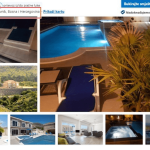Though the sought after produce and shopping aims may alter, Croats will likely always be hopping over the Bosnian border for something or other…
As Novac/Stanislav Soldo writes on the 23rd of January, 2020, previously, oil, milk, sugar were being bought over the border in neighbouring Bosnia and Herzegovina, and today it is mainly fuel, because the aforementioned basic foodstuffs are now being sold much more cheaply than they used to in large shopping centres in Croatia, which are increasingly attracting buyers from Bosnia and Herzegovina in a rather ironic trend reversal.
Thus, Dalmatians now travel over the Bosnian border to purchase fuel and cigarettes, while citizens of Bosnia and Herzegovina come to Croatia for consumer goods that are sold in typical Dalmatian shopping centres.
Although fuel has now become significantly cheaper here in Croatia, it is still cheaper over the Bosnian border, and on top of that fuel stations in Bosnia and Herzegovina typically accept not only the Croatian kuna as payment, but euros and various types of card.
Because they can save about a hundred kuna, residents of Dalmatian border areas, such as the Neretva valley and wider region, Vrgorac, Imotski and the surrounding areas have been taking a quick trip over the Bosnian border and tanking there for years on end now.
The most sought-after Eurosuper 95 from over the Bosnian border costs 2.20 BAM (convertible marks), which, when converted to kuna, stands at around HRK 8.47, while in Croatia, the same fuel comes with a price tag of HRK 9.98.
Therefore, the price over the Bosnian border is lower by about HRK 1.51 per litre of petrol. Diesel in Bosnia and Herzegovina costs 2.30 BAM or HRK 8.85, while its price in Croatia is HRK 9.85, so, over the Bosnian border it is significantly cheaper per litre. The calculation is simple, and the monetary savings per litre of fuel are more than reason enough for more and more drivers from Dalmatia to fill their tanks out of Croatia and just over the Bosnian border.
Despite the lower price of fuel in Bosnia and Herzegovina, Croats who still don’t take advantage of the bargains refrain from doing so owing to fear that it may be of lower quality than that sold here in Croatia. Specifically, lower quality standards are applied in Bosnia and Herzegovina than in Croatia, so some types of derivatives contain higher amounts of sulfur than those purchased within Croatian territory.
However, a lower price breaks down the majority of barriers for all sorts of people, especially in these more difficult times when people’s pockets are shallower and wallets often somewhat lighter.
In addition to refueling, certain brands of coffee can be drunk at fuel stations across the Bosnian border for about HRK 4, and cigarettes, which are on average cheaper by about HRK 5 per pack.
”Even if fuel and cigarettes in Bosnia and Herzegovina were to get more expensive, it will still be more profitable for us to buy it there than in Croatia!,” customers from Dalmatia state. They are not afraid of potentially poor quality fuel being sold over the Bosnian border.
”Oh, they’re just stories, you can usually get simple 95 or 98, which is better quality than it is in Croatia,” they claim.
All this is reason enough to “pull” many Dalmatians across the Bosnian border at least twice a month for fuel and cigarettes or cut tobacco, which cannot be legally brought into the Republic of Croatia.
”I know cigarettes are harmful, but I can’t stop smoking, that’s the only pleasure I have. I have no money for a box of “Croatian” cigarettes. I used to buy cigarettes over the border, and now I only buy tobacco and I roll it myself,” one pensioner stated, who barely makes ends meet with her 1,800 kuna pension. When purchasing it over the Bosnian border, a mere 20 BAM spent is enough for a whole month of enjoying nicotine for her.
Experienced Croatian cross-border shoppers and seasoned bargain hunters claim that sell shopping malls are receiving kuna in the shopping centres close to the Bosnian border with Croatia, but the exchange rate is not that favourable, so it is more profitable to pay with a card.
However, if you go deeper into Bosnia and Herzegovina, the Croatian kuna stops being accepted tender. They want only Bosnian convertible marks there, or you’ll need to pay with a card. However, even in this case, it’s also still well worth the purchase for most.
Another added benefit is VAT refunds at the Bosnian border and the only condition is that the goods must be removed from the territory of Bosnia and Herzegovina.
Make sure to follow our dedicated lifestyle page for much more.









